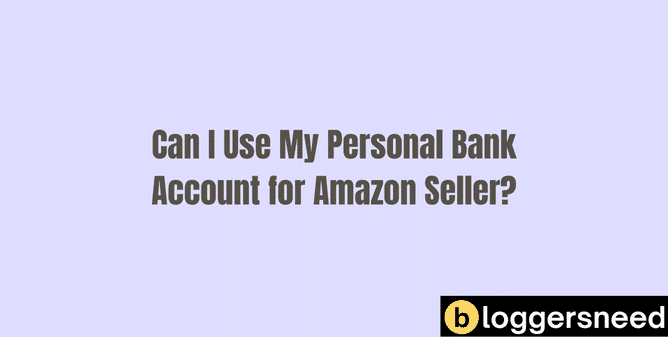
Are you an Amazon Seller looking for a convenient way to manage your finances? Utilizing a personal bank account may be an attractive option, but it comes with its own unique advantages and disadvantages.
This article will explore the benefits and drawbacks of using a personal bank account, the requirements to do so, and why it’s recommended to open a separate business bank account.
Continue to learn more about using a personal bank account for Amazon sellers.
Table of Contents
Advantages of Using Personal Bank Account
Here are the main advantages of using your own bank account for your Amazon seller business.
It enables quick access to funds, providing more control over financial transactions. This reduces the need for additional banking services and allows the seller to keep track of expenses and profits.
The verification process is also simplified when using a personal bank account.
Moreover, it eliminates any extra fees associated with business accounts, and the user can easily transfer funds into their own account.
Furthermore, the seller can take advantage of the bank’s features and services such as automatic bill pay and online banking.
But wait! there are some disadvantages of using personal account with Amazon seller account.
Disadvantages of Using Personal Bank Account
Using a personal bank account for Amazon seller transactions can come with some risks. You may be exposed to higher risk of fraud and financial losses. Transaction limits or fees may also impact your selling activities.
You Pay High Taxes
Chances are really high when you connect your personal bank account with the Amazon seller account.
Your Personal money and Amazon money gets mixed missed and you end up paying high taxes which will affect your business profit.
If anything happens it may not be easy to sort out any issues arises from your bank side or Amazon side.
Higher risk of fraud and financial losses.
You’re exposing yourself to a high risk of fraud and financial losses when you use a personal bank account for Amazon seller activities. Fraudsters have an easier time accessing personal bank accounts, as they don’t need to know as much information as they’d for a credit card or a business account.
Additionally, personal accounts lack the legal protection and insurance that business accounts have. This means you could be financially liable for fraudulent charges. Plus, if your account is suspended, you won’t have the same legal recourse to get it reinstated as you’d with a business account.
To protect yourself, consider using a separate bank account for Amazon seller activities.
Transaction limits or fees may impact sellers
Often, you’ll find that using a personal bank account for Amazon seller activities has limits or fees that can impact your business. These include:
- Amazon’s fee for receiving payments, which is taken from the seller’s account.
- The limits on how much can be transferred from a personal bank account.
- Fees associated with using a credit card to make payments.
- The potential for additional fees if the account is overdrawn.
Using a personal bank account for Amazon seller activities can be convenient to setup, but it’s important to be aware of the fees and limits that may be associated with it.
Understanding the risks and costs associated with using a personal bank account can help sellers make informed decisions when it comes to their Amazon payments.
Requirements for Using Personal Bank Account
Before using a personal bank account as an Amazon seller, you’ll need to meet certain requirements. This includes having a valid government-issued ID, proof of address, proof of income, and signature authorization.
Additionally, you’ll need to provide a debit card or a recent credit card statement, a business address, a business license, and two utility bills. All documents must be up-to-date and in good condition.
Keep in mind that if you don’t have all the necessary documents, your application may be rejected. Therefore, it’s important to make sure you have all the required documents before submitting your application.
No liability protection with personal account
Although you may have all the necessary documents for a personal bank account, it’s important to note that there’s no liability protection associated with it.
Using a personal bank account for business transactions means you’re personally responsible for any payments made with a credit card, debit card, or bank account.
Additionally, if your business incurs any debt, you as the owner are liable for repayment.
While a business entity may offer you some protection, it’s important to remember that all credit card payments, bank accounts, and other financial products are ultimately your responsibility.
Make sure to weigh the risks and benefits of using a personal bank account for Amazon seller.
Always Recommended to open separate business account
With the potential liabilities associated with using a personal bank account for business transactions, it’s recommended that you open a separate business account.
This will help protect your personal finances and assets from any legal issues or financial complications that may arise from selling on Amazon.
There are several benefits to having a business account.
- It allows for more accurate tracking of funds, as business accounts are typically used to keep track of income and expenses.
- It provides sellers with a secure way to verify their identity, which is necessary for Amazon’s verification processes.
- It provides the peace of mind that comes with knowing that your personal accounts are safely separated from any business accounts.
Opening a separate business account is a simple and beneficial step that Amazon sellers can take to ensure their safety and success.
Conclusion
Using a personal bank account for an Amazon seller has both advantages and disadvantages.
It’s important to weigh the pros and cons of using a personal account before deciding to do so, as it doesn’t provide any liability protection and it’s recommended to open a separate business account.
Ultimately, it may come down to the individual seller and how comfortable they’re with the risk associated with using a personal account.
The truth is, while it may be convenient to use a personal account, the risks may not be worth it.
New to Amazon seller business? here are the 10 tips you should read now.
Affiliate Disclosure: Some of the links in this post are affiliate links, which means I may earn a small commission if you make a purchase through those links. This comes at no extra cost to you. Thank you for your support!
